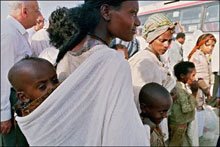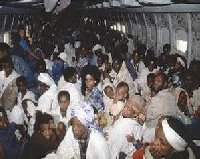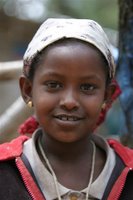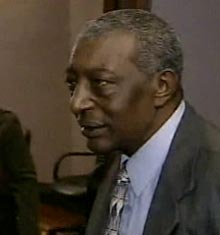
There's a new book out by Stephen Spector, titled, Operation Solomon: The Daring Rescue of the Ethiopian Jews. It tells the story of the 1986 airlift rescue to Israel from Ethiopia of 36,000 Falashas - Jews of Ethiopian origin. The airlift took place over a day and a half. El Al jumbo jets were emptied of their seats and made the trip to bring their precious cargo to Israel. It happened without a hitch. In fact, there were a couple of live births during the airborne hours and some wonderful human
 interest stories which were widely reported at the time. Since there is a press corps of 800 or so international reporters in Israel, there is never much that goes uncovered there. Operation Solomon was no exception.
interest stories which were widely reported at the time. Since there is a press corps of 800 or so international reporters in Israel, there is never much that goes uncovered there. Operation Solomon was no exception.I digress for a moment - Falasha is not exactly a polite term. It's more derrogatory than anything, but once I heard the Ethiopians in Israel refer to themselves as Falashas, I realized that like everywhere else, names are not really what counts here.
One more digression: I have to brag about my husband for a minute. Marty played a significant role in the airlift matter at the time. I don't say that lightly. Everyone in the philanthropic and social service world of Jewish federations surely would like to be associated with that heroic and historic event. But Marty was really there, doing the important stuff like the inter-governmental negotiations, shuttling between the States, Israel and Ethiopia,and fund raising. I have the pictures from the loan guarantee signing, faces smiling, glasses raised.
Having said all this, I want to empower you with the other side of the coin, which will be known heretofore as The Truth.
Around 1983 in Toronto I had a band called Culture Shock. I'm sure that you remember us if you were a Queen Streeter, a Kensingtonian or an Ontario College of Art student. We were six or seven musicians, including three dreads and three white girls plus an assortment of horn players and people we loved who were great musicians and just wanted to sit in with us.
One night my friend and percussionist, Kwame, called to invite me to see some clips from a yet-unfinished film about the plight of the Ethiopian Jews. True, I was from the ghetto, but it was the Holocaust survivor ghetto of Bathurst Manor. I did not know anything about African Jews, other than those of North Africa. I called a few other band members and the group of us made our way to the synagogue where the intriguing film clips were being screened.
The houselights dimmed. An image of a teenage boy dressed in a white frock flashed on the screen. He was strumming a krar -- yes, that's what it's called. Fateful now, looking back. Anyway, it's a stringed instrument played with a plectrum. This boy, David, was singing of his longing for Jerusalem. It was a stunning moment for me. Black. Jewish. Music. Suffering. Longing. The story of my heritage. My father's experience in concentration camps. My mother's wanderings throughout Russia and Siberia during the war. The shattering of families. Our inability to feel at home in a place. Jewish oppression again. I am sitting with members of my band, Culture Shock, several members of whom were of the reggae band Truths and Rights. The Truth. All converging. A few more clips and then the houselights went up again.
The filmmaker, Simcha Jacobovici, gave his pitch. He told about sneaking cameras into Ethiopia and finding communities to visit. The fund raising ensued. Susan Pollack, director of the Canadian Association for Ethiopian Jews was on hand. What a dynamo. Wow. Who even knew such a thing existed? Who was having "culture shock" now?
I had no money. Culture Shock had no money. But I knew I could put on an event on Queen Street, attract a few bands and come up with some cash and raise some awareness. At my suggestion of this, Simcha and Susan were completely underwhelmed and skeptical. But when my childhood friend Rob Gasner offered to help pull it off, they perked up. Rob's family had been helpful in supporting the project. It showed The Truth.
That night I did not sleep. I had many, many more sleepless nights, thinking of our -- yes, OUR people! -- and the pending fate that awaited them if we did nothing. Most of the people who were deeply inv
 olved were Holocaust survivors and their children. I attribute that to the fact that we'd just been through a genocide and that we were not going to be passive. We were/are still angry and active. My people do for others. That's already been transferred to a third generation.
olved were Holocaust survivors and their children. I attribute that to the fact that we'd just been through a genocide and that we were not going to be passive. We were/are still angry and active. My people do for others. That's already been transferred to a third generation.And I read what scant academic things I could lay my hands on at York and U. of T. I read The Falashas by David Kessler and Falasha Anthology, which is an amazing book of Ethiopian Jewish apocrypha compiled by Wolf Leslau. I followed the news stories about the political and military struggle in Ethiopia.
Meantime, CAEJ continued its work, raising money to pay for individual bogus student visas for Ethiopians. Since Canada had the diplomatic ties that the States did not have, we did the work. The cost was around $2,500 per person. Imagine, little old ladies and men waving their student visas at the Immigration officers upon their arrival in a German airport. And then they were diverted to El Al planes and taken to Israel by our operatives.
It took a year of back-and-forth, but finally we mounted our event at the Rivoli. In the process, Simcha and many of the Canadian Association for Ethiopian Jews members came out. I was so proud and humbled by their presence. We drew a crowd. It was 10 bands and me, the hostess. I took the heat for not performing that night. I am still ambivalent about it all these years later, but I was on a mission. We had media. We had a room filled with people who were talking to each other about Falashas and human rights. We had raised $1,700. The centerpiece was an impassioned plea by the passionate, energetic, incredible, charismatic and articulate Baruch Tegegne. Not a dry eye in the house, including his own.

In the weeks before the event, I got to know Baruch Tegegne, an Ethiopian Jew who came to Montreal after living for many years in Israel, since the 1960s. He was the most vocal advocate on behalf of Falashas at the precise time when the Jewish federation people were telling us to tone down while they were doing important work. Baruch was from the other side. He represented The Truth for many of us at that time.
We were not the well heeled, well educated Federation Jews. We were immigrants. Holocaust survivors and their children. Students. Poor. Undereducated. But mostly, we were angry about the possibility of another Jewish genocide going ignored until it was too late.
Who could blame us? We could not keep up with the comfortable uptown crowd whom we perceived were sitting around expensive conference room tables in their tailored suits. And we felt put upon by their arrogant insistance that we stay silent when the Baruch Tegegnes of the world were telling us to SPEAK UP. How could we stay silent? We were crying. Our hearts were crying. We sought out and found sympathetic people wherever this cause was taken - throughout Canada and the United States. We spoke out. We raised money. Because that's what was needed for those crucial student visas, Baruch told us.
There were many Falashas in Israel who felt that now was not the time to keep our mouths shut. The Jews kept their mouths shut during World War II while the SS St. Louis tried to dock in the States and ultimately
 returned its persecuted human cargo to the ovens and gas chambers of Nazi Europe. No, we were not going to stay quiet. Not this time.
returned its persecuted human cargo to the ovens and gas chambers of Nazi Europe. No, we were not going to stay quiet. Not this time.Baruch and Simcha were speaking to groups, to anyone who would listen. Meantime, Simcha's movie got made and it exploded on the scene. He was banished from the Knesset, threatened by Ethiopian officials and shunned by the mainstream Jewish community. A roaring success in making everyone uncomfortable and enlightening them at the same time.
The weekend of the Rivoli event, Baruch and his family stayed in the Bathurst Manor ancestral home where I grew up. My father, who survived Auschwitz, Buna and Poznan, and has a tattoo on his arm, understood Baruch right away. They were both survivors who had to do many unspeakable, unthinkable things in order to survive. It was a bitter-cold weekend. Baruch had a Cadillac, Gd Bless him, but he did not have a warm coat. My father gave him his own coat off his back and told him to keep it. My mother doted over his daughter and wife, and we all became a family that weekend. I will remember that weekend for the rest of my life.
I am running too long already. But I will update you now. It is not pretty. There are no laurels. There is no happy ending. In the years that followed the airlift, Ethiopian Jews faced hardships in Israel. They were not recognized as Jews and thus had to undergo ritual conversion. They did not want to "blend" into the melting pot of Israel. They wanted to keep their own traditions. There were big problems. Very big problems. Suicides. Malnutrition. Truancy. Health issues. Xenophobia. And culture shock.
I spent 1984 in Israel, on the receiving end of CAEJ's mission, helping newly arrived Ethiopians settle into their new home. I kept up an apartment for the new arrivals and made sure they were in touch with local Ethiopians who spoke their own dialect -- it has long been reported, although not in Spector's book -- that there is a historic rift between the two groups of Ethiopians who have their own language. I reported this work to CAEJ in lengthy, typewritten letters.
Simcha is making some of the finest documentaries around. He has come a long way from the midnight hockey-playing gorgeous guy who was traipsing around the world doing amazing things. Now he is a settled-down dad (still gorgeous) who is traipsing around the world doing amazing things.
As for Baruch Tegegne, his fate has not been as gentle. Now 61, he suffers from severe kidney disease and has dialysis several times a week. He awaits a kidney transplant. Please read and respond if you can help. It's not too late if you ACT NOW. http://jewishworldreview.com/0605/tegegne.php3
Meantime in Israel we are seeing a lot of Ethiopian men working as security guards, checking bags for bombs and explosives at public spaces such as malls, stores, and so forth. There is a generation of angry youth now, too. They listen to angry music and dress and act the part of the gangstas. Bleak futures and crime are on the horizon. These are the children of those who came on the airlift. What did the people sitting around the Federation tables do for them since then? Or was getting them to Israel the end of the job? That is not really fair to say and I recognize that.
What did we do? Those of us to spoke out? Did we help:? In the beginning we thought we were doing it right. We wanted to see them come to the Jewish homeland with open arms.
Yes, there are agencies in Israel that are helping integrate this community as a whole, and yes, there are plenty of good people who are giving their all. But we should not assume that there is nothing left for the rest of us to do.
This is not the time for any of us to sit back and pat each other on our backs, whether we are in Brooks Brothers or Birkies .
How will we prevent the probable race riots and social injustice that we have helped foster by staying silent since we checked "airlift" off our To Do list?
This time NOT ONE PERSON should stay silent. Now that we have brought the Falashas to Israel, no one should be silent until they are integrated as every other wave of immigrants have been integrated.
Simcha, if you're reading this, NOW would be the time to update your excellent documentary.
No comments:
Post a Comment